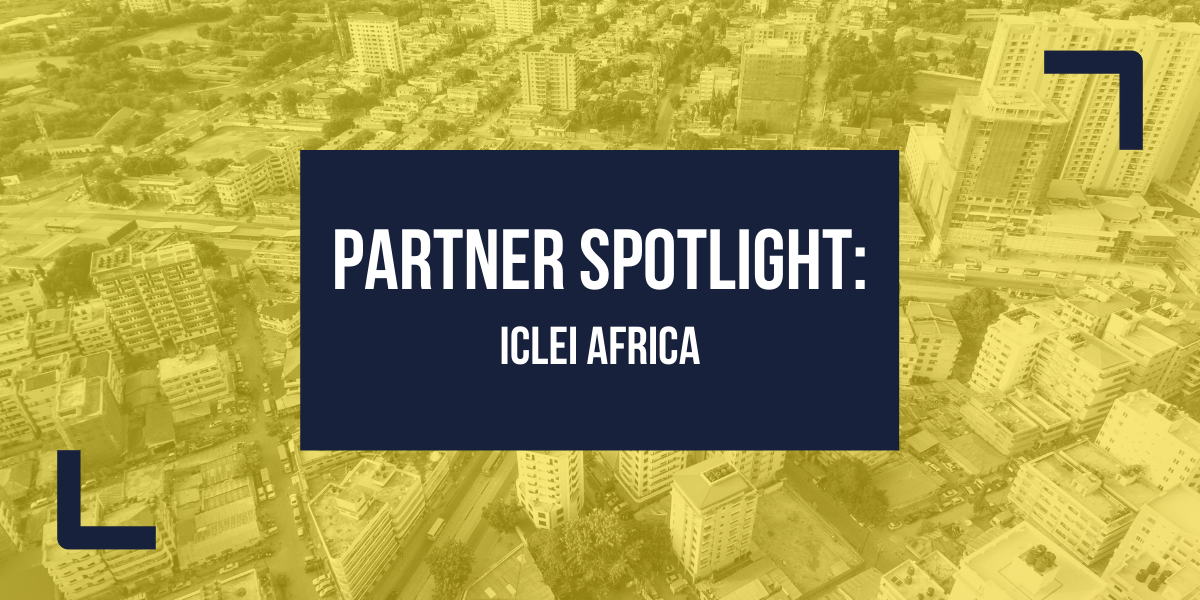ICLEI Africa is the regional office that serves African cities, towns and regions, as part of ICLEI – Local Governments for Sustainability, a global network of more than 2,500 local and regional governments committed to sustainable urban development. Active in more than 125 countries, ICLEI influences sustainability policy and drives local action for low emission, nature-based, equitable, resilient and circular development.
Meggan Spires forms part of ICLEI Africa’s senior management team, that guides ICLEI Africa’s staff in the implementation of sustainability programmes and projects across the African continent.

What do you think is the most important aspect that ICLEI Africa brings to the consortium?
We bring experience of working with transdisciplinary methods, in collaborating with local governments. ICLEI Africa has worked hand-in-hand with subnational governments for the past 20 years, assisting cities, towns and regions across the continent in forging forward on their sustainability journeys. We therefore understand how cities work and how to collaborate most effectively with them for local impact and change.
A key goal of ACRC is to ensure that our research will be utilised by city governments. We aim to harness our experience of supporting local governments in working effectively with civil society, researchers and business, to ensure, with our ACRC partners, that we leave a lasting legacy in the project cities, and across the continent.
How did you become involved with ACRC?
With ICLEI Africa’s focus on meeting cities where they are at, and serving city needs, we have been tackling poverty and inequality within Africa cities, through a sustainability lens, since our inception. ACRC also has an explicit focus on tackling inequality and poverty head-on, so it made sense to work together. We feel strongly that development in Africa has to be carried out in a sustainable manner, always mindful of the significant climate change impacts that manifest at the local level. Being a part of ACRC allows for the continuation and development of our mutually held goals for the benefit of African citizens.
“We feel strongly that development in Africa has to be carried out in a sustainable manner, always mindful of the significant climate change impacts that manifest at the local level.”
What do you think is most interesting thing about ACRC’s approach to urban development?
This programme will be tackling the root causes of the problems at hand – it looks at the systemic challenges experienced in African cities, and will develop transformative solutions, rather than just dealing with symptoms. We are very excited about being involved in a programme that will lead to long-term and lasting positive change in the cities we serve.
What do you think is the most crucial challenge for development in African cities?
Good governance underpins good development, and enhancing how governance occurs, particularly in these unprecedented times, is essential. Inequality is also a significant challenge that must be tackled for development achievements to be built upon, and not undermined. We know that effective governance plays an essential role in unlocking the resources necessary for development that prioritises the most vulnerable in our societies.
“The diverse set of organisations within the consortium all bring versatile skillsets to the project, which unlocks new networks, new opportunities and new ways of working. With all hands-on deck, we are excited, as ICLEI Africa, to be involved in a project that can leave a lasting legacy in the cities we care so deeply about.”
What is the most exciting thing for you about this project?
The amount of time, space and resources offered for this project is really exciting, as it makes achieving real, long-term change possible. The diverse set of organisations within the consortium all bring versatile skillsets to the project, which unlocks new networks, new opportunities and new ways of working. With all hands-on deck, we are excited, as ICLEI Africa, to be involved in a project that can leave a lasting legacy in the cities we care so deeply about.
Read more from ICLEI Africa:
- Socially inclusive development: stories from African cities
- New tool supports deep explorations on data and circular initiatives: here’s what it means for African cities
- Innovations that could ensure universal energy access by 2030: stories from the Global South
Follow ICLEI Africa’s work:
Note: This article presents the views of the author featured and does not necessarily represent the views of the African Cities Research Consortium as a whole.
The African Cities blog is licensed under Creative Commons Attribution-NonCommercial-NoDerivatives 4.0 International (CC BY-NC-ND 4.0), which means you are welcome to repost this content as long as you provide full credit and a link to this original post.


